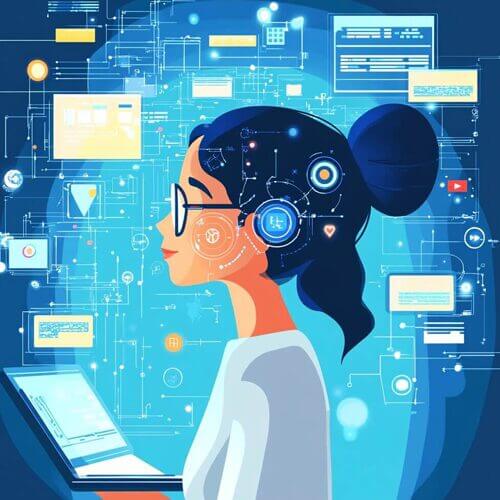Google's New AI Advancements in Search
This article explores Google's innovative approach to enhancing search functionalities using AI, offering a closer look at their potential impact on everyone.
Web Design Trends of 2025, the digital landscape is evolving rapidly, offering a wealth of inspiration for designers and creatives alike. From the shift towards voice search to the rise of interactive landing pages, the future focuses on crafting personalised and engaging user experiences. Whether you’re a seasoned designer or just starting out, we’ve got insights and tips to help your work stand out in this dynamic environment.
Engagement is key in 2025, and interactive design will become the norm. Take inspiration from Melbourne artist Beci Orpin, whose playful site invites users to check local weather and play a game while exploring her portfolio. This approach emphasises personality and personalisation. As designer Maddie Niemen states, “I love pushing myself to try something new; it keeps me curious and evolving.”
Creative developer Bruno Simon exemplifies this trend with a site that lets users navigate by driving a car, merging retro fun with modern UX. But remember, as CSS expert Andy Clarke advises, be thoughtful with your design choices—don’t make changes just for the sake of it.

Artificial intelligence is revolutionising web design, making it more accessible than ever. Tools can now analyse user preferences, suggest layouts, and revise designs instantly. AI website builders like Elementor AI and Wix ADI simplify the process, enabling even novices to create tailored sites.
Maddie emphasises that these tools empower more people to enter the design field. As we adapt to these advancements, web designers can focus on creativity and innovation, rather than just coding. Senior Product Designer Yuji Sekiya highlights that AI can enhance efficiency and creativity, freeing designers to explore new ideas.
Anti-design is making a comeback, as seen with Charli XCX’s unconventional album artwork. This trend celebrates breaking aesthetic norms—think asymmetrical layouts, bold colours, and unrefined elements. Brutalism is also back, showcasing bold typography and minimal imagery that reject sleekness for authenticity.
As WordPress expert Jamie Marsland notes, it’s fascinating to see how minimalist and brutalist designs coexist. Embrace this creative tension to make a statement!
Voice search is now an essential part of website UX. Major brands like Sephora and Walmart are optimising for voice commands, enhancing user convenience.
Designers must adapt by focusing on conversational content and quick-loading pages that provide direct answers to common queries.
With innovations like Envato’s ‘sounds like’ search feature, it’s more important than ever to understand voice search optimisation to boost your site’s visibility.
As environmental concerns rise, sustainable web design is crucial. Designers can reduce their carbon footprint by optimising media for efficiency, utilising responsive designs, and selecting energy-efficient hosting.
Brands are increasingly showcasing their commitment to sustainability through minimalist designs and nature-inspired imagery. Eco-friendly doesn’t have to mean dull creative approaches can convey sustainability while still being visually striking.

While tools for creating motion graphics and 3D interfaces are more accessible, there’s a risk of designs becoming repetitive. As Maddie points out, many sites start to look similar, which can lead to a lack of originality.
Designers must strike a balance between utilising these tools and maintaining unique creativity. Too much motion can overwhelm users, so thoughtful application is key.
In an increasingly crowded digital space, a focus on fundamental design principles is essential. Many current designs lack depth, often because their creators lack formal training.
Resources like Understanding Accessibility emphasise the importance of typography and layout. Simplifying designs can allow the core message to shine, and incorporating organic elements, like hand-drawn illustrations, can enhance authenticity.
Amid the rise of AI, there’s a growing appreciation for human imperfection in design. Many designers are embracing handmade, organic elements that add a personal touch. This philosophy, reminiscent of wabi-sabi, highlights beauty in imperfection and connection to nature.
As trends evolve, there’s a craving for more authentic, human-centric designs. For those looking to infuse this vibe into their work, exploring natural shapes and botanical designs can lead to unique outcomes.
Staying updated with web design trends is vital for anyone aiming to make an impact online. Consider how voice search and sustainable design can inform your next project, and think about the balance between AI tools and human creativity.
Whatever your approach, enhance your skills with tutorials and courses, and keep an eye on emerging trends to stay ahead in the dynamic world of web design.
This article explores Google's innovative approach to enhancing search functionalities using AI, offering a closer look at their potential impact on everyone.
In today's rapidly evolving technological landscape, the integration of AI in web design is revolutionising the industry.
Artificial intelligence has revolutionised various industries, and content writing is no exception. AI-powered tools can generate content quickly, but they come with both advantages and limitations.